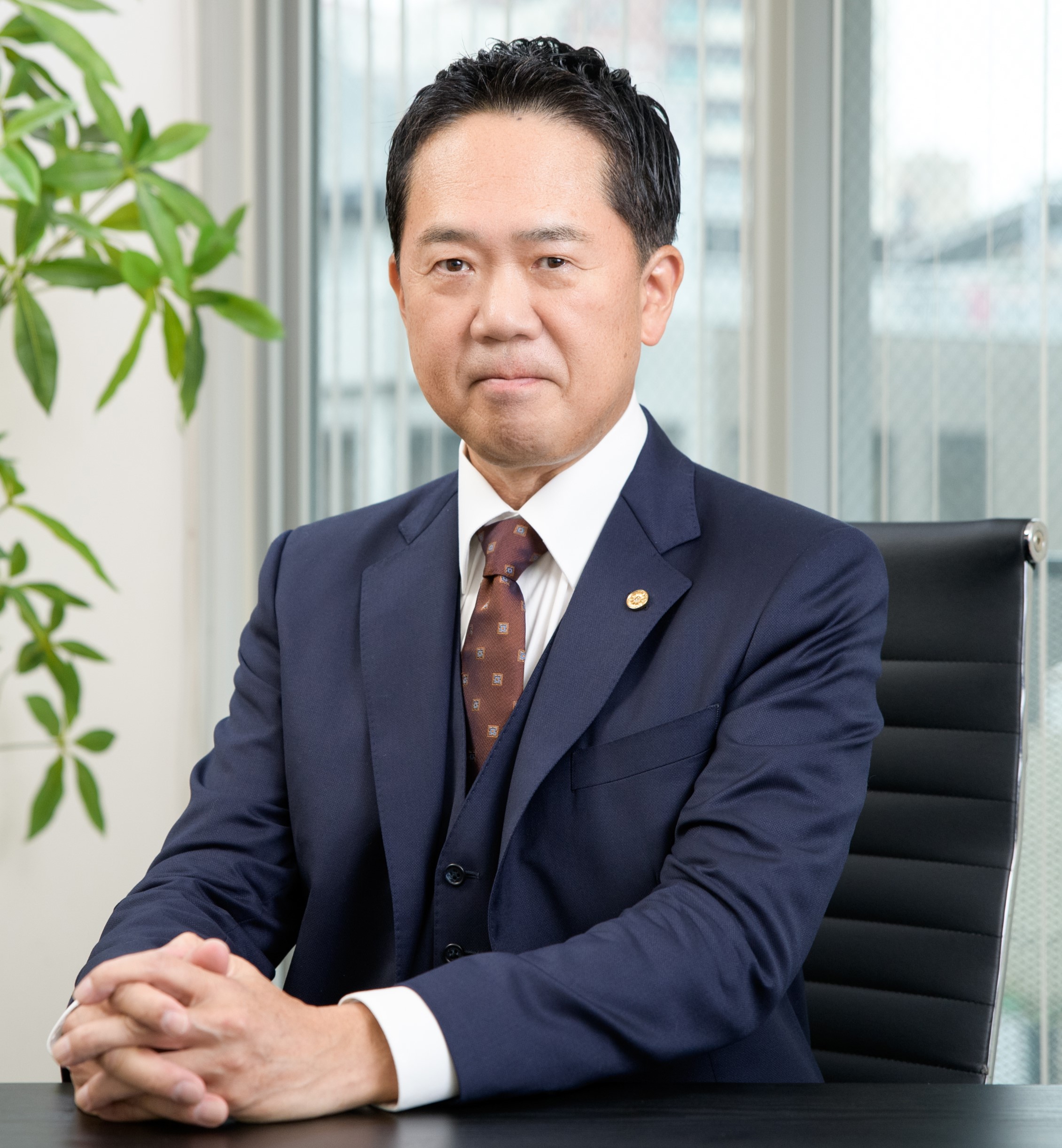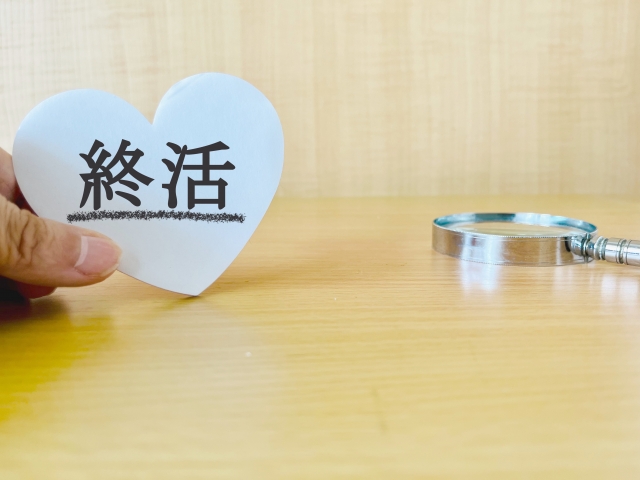We hear the term "Tekkatsu" more and more, but do you know what it actually means and how you should start it? Although "Shikatsu" refers to activities to prepare for one's final days in advance in order to better prepare for the end of one's life,It is not merely an estate arrangement or funeral arrangement, but also an opportunity to reflect on life and prepare emotionally for yourself and your family.In this article, an administrative scrivener, certified as a financial planner and an advanced inheritance diagnostician, will explain what you need to know when you start end-of-life planning, from the basics to how to actually proceed and how to deal with family members.

People who should read this article
What kind of life after death is something we hear a lot about these days? What is it?
People who are still young but need to think about retirement planning and investments.
People who have retired and begun to seriously consider retirement living.
People who have begun to think about inheritance and other matters after their own death.
People who want to make a will but are hesitant
LGBTQ or unmarried people who wish to leave a legacy to their partner.
Basic Knowledge of End of Life (Shukatsu)
making preparations for one's deathrefers to the activity of preparing and organizing oneself in advance of the end of life. It mainly includes various aspects of preparation, such as organizing one's property and estate, arranging funeral and graveside services, and communicating messages to one's family and surroundings.
Why do we need end-of-life planning?
Although it is often understood that "end-of-life planning" is something you do in your old age to prepare for your inheritance after your death, this is by no means the case. Everyone reaches the end of his or her life at some point. By starting your "Tekikatsu" early, you will be able to make the most of this opportunity,It can help you sort out your life and provide you with a sense of emotional security. End-of-life planning is an important step toward a better life.
When to start end-of-life activities
Although the timing and motivation for starting end-of-life activities vary from person to person, there are manyIt is said that many people often feel that they should have started earlier.Since end-of-life activities are meant to be preparations for the end of life, many people wonder when to actually start. Here are some general timing and triggers.
Whatever the timing, end-of-life activities are not only a way to prepare for the "end of life," but also a good opportunity to reflect on your life and your relationships with your family, your partner, and the people around you!
- In their 60s or when they reach retirement age
With retirement comes a major change in lifestyle and living arrangements. This period is considered a good time to start end-of-life planning, as people are freed from work and have more opportunities to think about how they will spend their future lives, as well as their retirement and afterlife. Many people consult with financial planners on how to invest their retirement funds and how to receive pensions. - When experiencing a major illness or injury
A major illness, injury, or surgery raises one's awareness of one's health and life. This often creates a motivation to prepare for one's final days and organize messages to one's family. More people consider end-of-life planning when they become concerned about their own health.
In addition, when a person is hospitalized or undergoes surgery for illness or injury, the basic rule is that only family members are allowed to visit or be present, and only legally recognized family members, such as premarital partners and LGBTQ partners, are allowed to be present. Although the law has gradually been improved in recent years, this is a good opportunity to legally establish your relationship with your partner. - When someone close to you dies
When someone close to you, such as a family member, partner, or friend, passes away, you have more opportunities to rethink your life and death. Such an event is a great opportunity to become aware of "one's end" and often motivates people to actually start end-of-life planning. - When considering inheritance and estate planning
When issues related to inheritance and legacy become a hot topic among you and your family members, it is also an appropriate time to begin end-of-life planning. This is an important preparation for the future, as it can prevent problems among family members through the distribution of property and the preparation of a will. - Timing of life's milestones
For example, when one's children become independent, when one's family structure changes due to marriage or divorce, or even at life milestones such as retirement or job change, it is an opportunity to think about one's future life and final days. Many people begin end-of-life planning at these times.
How to start end-of-life activities
- Influence of media and friends
Recently, the topic of end-of-life living is increasingly being discussed on TV, in magazines, and on the Internet, and many people become interested in end-of-life living after seeing this. In addition, people often hear that a friend or acquaintance has started end-of-life planning and decide to start preparing for it themselves. - Sense of uncertainty about the future
Concerns about life and health in old age and feelings of loneliness may motivate people to make end-of-life decisions. Particularly in an age of late marriages, rising lifetime unmarried rates, diversifying personalities such as LGBTQ, aging society with fewer children, and nuclear families, people are increasingly fearful of facing their final days alone, and many feel the need to make preparations for peace of mind. - The Need for Digital End-of-Life
Today, more and more people have many digital assets, such as social networking accounts, online banking, and cloud services. Thinking about how these digital legacies will be handled after one's death is another opportunity for end-of-life planning. Digital end-of-life planning is expected to become an increasingly important topic in the future. - Family Communication
When you have the opportunity to discuss your final days with your family, it is also a great opportunity to begin end-of-life planning. By preparing your family to know your wishes and to watch over you with peace of mind, you can build a better relationship with them. - When I made my life plan
When you feel anxious about a large sum of money in your life, such as funds for a home purchase or retirement, and you create a life plan, it is a good opportunity to think about end-of-life planning. Creating a life plan is an important action to prepare money until your death and live a secure life. By creating a life plan, you will naturally think about the rest of your life.
Advantages of Starting End-of-Life Planning Early
As for the benefits of starting the end-of-life process early,This is to provide a sense of spiritual security.By making your wishes clear and completing the necessary procedures, you will not panic when the time comes. It is also easier on the family and partner to respect the wishes of the deceased and have preparations in place so that the end of life can be peaceful.
Whatever the timing,End-of-life activities are not only a way to prepare for "the end," but also a valuable opportunity to reflect on one's life and cherish relationships with family and others around one.
Wills and Ending Notes
While both wills and ending notes are important elements in end-of-life planning, their different purposes and formats make it important to use them according to individual needs and circumstances.
The Role of a Will and How to Prepare One
testamentis a document that allows the distribution of property or specific instructions to be left in a legally enforceable form after the person's death.The Civil Code strictly defines the form and requirements of a will, and for a will to be legally effective, it must be made in a form that is valid to the law.To avoid disputes after your death, and to ensure that your will is left intact, it is recommended that you prepare your will with the help of a specialist such as an administrative scrivener.


The Role of the Ending Note
booklet constituting an informal living will (containing wishes regarding one's hospitalization, funeral, etc.)is an important tool for communicating your wishes and wishes to your family and loved ones, although unlike a will, it does not have legal force.
People tend to think that an ending note is something to be prepared at the end of one's life in place of a will, but this is not true. This is so that if something should happen to you, the people you leave behind will not be troubled.
- Message to Family
In the ending note,You can leave a last message of gratitude that you normally cannot say, or a final message to your family, friends, or partner.It is especially effective as a means of expressing one's final wishes by giving form to thoughts that are difficult to convey in words. - Communicate your funeral or memorial service wishes.
By writing in advance the format and size of your funeral, and whether or not there will be any religious rites, the bereaved family can make preparations without hesitation. This is because it is also possible to state whether or not a funeral service will be held, what type of ceremony is desired, and how the remains will be handled (grave, tree burial, ocean scattering, etc.),Your family can have a funeral that reflects your wishes without feeling burdened. - Arrangement and transmission of property
What and where is the estate or property?You can leave a note saying who you want to give what to.It serves to help families keep track of information about their property, such as bank accounts, insurance information, debts and loans, etc. This prevents the surviving family members from having trouble sorting through the estate. - Clarify your medical and nursing care preferences.
You can include in your Ending Note your wishes regarding medical treatment and life-prolonging treatment in the event that you become ill or injured and are no longer able to express your wishes, as well as your choice of nursing home. This will make it easier for your family to make decisions in accordance with your wishes. - Digital Heritage Management
It can also include information about digital assets such as social networking accounts, online services, digital photos, and cloud storage. This can help clarify how surviving family members should handle the information and assist in deleting unwanted accounts and preserving important data. - Recording of personal history
You can record your lifetime memories, accomplishments, and cherished values.This is the most important element in the ending note.This will help you pass on your life perspectives and lessons learned to your family and future generations, and help those you leave behind understand how you lived your life.
How to Prepare an Ending Note
- Notebook selection
You can find ending notes commercially available at stationery stores, bookstores, and online, or you can make your own from scratch. The commercially available ones are convenient for first-time users because the items are pre-set and all you need to do is fill in the necessary information. When creating a customized notebook for yourself, you can use any format you wish, but it is also recommended that you seek the opinion of an expert such as an inheritance diagnostician. - Item Entry
The content of the ending note is intended to clarify your wishes and wishes so that those left behind will not be troubled by them. The following sections will help you fill in the important details.- personal information(name, date of birth, contact information, health insurance card or pension number, etc.)
- Message to Family(Gratitude or thoughts you wish to convey)
- Property and insurance information(bank accounts, stocks, real estate, insurance information, etc.)
- Funeral wishes.(funeral format, funeral home, attendance preferences, treatment of remains, etc.)
- Medical and nursing care preferences(i.e., wishes for life-prolonging treatment, wishes for placement in a nursing home, etc.)
- digital heritage(social networking accounts, email addresses, online banking information, etc.)
- Other Special Notes(e.g., pet care, hobbies, etc.)
- inform one's family
It is important that you inform trusted family members and friends of the existence of your ending note after you have finished writing it. Since an ending note has no legal effect, it will be meaningless if no one knows about it. By informing them in advance, even briefly, about where the note is kept and what is written in it, they will be able to deal with it smoothly when the time comes. - Regular updates
Because the information in the ending note is subject to change over time,It is important to review and update them on a regular basis.As circumstances change or new wishes emerge, revise your notes accordingly to reflect the latest information. - Feel free to get started
Unlike a will, an ending note is an easy way to get started.We recommend that you proceed as if you were freely writing down your thoughts and feelings, without thinking too hard.You do not have to finish everything at once; you can proceed at your own pace, little by little.
Things to consider before starting end-of-life planning
Beginning life at the end of life isIt is about reflecting on one's life, reassessing one's relationships with family and partners, and thinking about one's afterlife.It is important to start casually and gradually move forward with proper preparation.End-of-life living will make the rest of your life secure and prosperous.
Communication with family and partner
Some of the most important things to consider before beginning the end-of-life process areClarifying your intentions and wishes and communicating with your family and partnerIt is. End-of-life planning is not just about preparing for your own death, but it is also an opportunity to rethink how you will spend the rest of your life and how you will leave a legacy to your family.
Organize your mind and reflect on your life
Before you begin your end-of-life planning, it is important to think about the values and outlook on life that you hold dear.By sorting out what you have valued in your life, how you want to spend your retirement, and how you want to spend your final days, you will be able to identify specific actions to take.For example, "I want to spend more time with my family and partner," "I want to take better care of my health," "I want to spend my final days quietly at home," etc. The starting point is to create a vision of your own desired future.
Planning for retirement
As part of your end-of-life planning, you should also consider planning for your retirement.For example, we will simulate realistic living situations, such as how you would like to live after retirement, where you would like to live, living expenses, and preparation for when you need care.It is also important to consider how you can live with peace of mind. Planning for the financial aspects of your life, such as pensions, savings, insurance, and the selection of a long-term care facility, will help ensure your future security. With the help of a financial planner, you can create a concrete and realistic plan for your retirement.
Estate liquidation and tax planning
Organizing your estate is another important part of end-of-life planning. It is necessary to grasp the entire picture of one's estate and consider how it will be distributed. Real estate, financial assets (savings, securities, insurance, etc.), debts, etc. are all listed and measures are taken to prevent inheritance problems. It is effective to prepare a will or include information about your property in an ending note.
It is also essential to prepare for inheritance and other taxes. Many people think that they have no assets that can be called wealth, but in many cases, the value of their homes has increased more than they thought, and this can result in unexpected burdens on their remaining family members. It is important to take early action with the help of experts.






Cemetery and funeral arrangements
Preparations for graves and funerals are an important part of end-of-life planning. By making these preparations in advance, you can be prepared to meet your end as you wish, without burdening your family and loved ones. Below are details regarding grave and funeral preparations.
Grave Types
A grave is an important issue: how will the remains be handled after the death of a person? Preparation for a grave begins with consideration of where the remains will be placed and in what manner you wish them to be memorialized.
- General Cemetery
A traditional grave is a place where a stone monument is erected and family and relatives can hold memorial services. There are public cemeteries, private cemeteries, and temple cemeteries. You can choose a memorial service based on your religion and local customs. - cemetery for those who died in battle
This type of grave is often chosen when there is no successor or when the family does not want to be burdened. The remains will be cared for in perpetuity by a temple or cemetery. In some cases, the remains are individually cared for, while in other cases, the remains are cared for together with those of other family members in a jointly enshrined grave. - charnel house
This is a type of grave where the remains are enshrined in an indoor facility. There is space for individual storage, and worshippers can hold memorial services inside the facility. Recently, this type of cemetery has become more common in urban areas and is a convenient option for those who do not have a cemetery. - arboriculture
In this method of returning remains to nature, trees are planted in place of headstones to create a form of memorial service that is one with nature. This is increasingly being chosen by people who are nature-conscious and environmentally conscious. Since no headstone is required, the cost is relatively low. - scattering of ashes (cremated remains) at sea
This method involves powdering the remains and scattering them in the ocean. Although legal permission is required, it is an attractive option for those who wish to return to nature.
Things to consider when choosing a grave
- Location Selection
It is important to choose a location that is easy for family members to visit and that is quiet and surrounded by nature. The location and accessibility of the cemetery should also be taken into consideration when families visit for memorial services later on. - Cost Considerations
Costs vary depending on the type of grave. Check in advance the total cost of purchasing the land, installing the headstone, and paying for the management fees, and make preparations within a reasonable range. It is also necessary to confirm how future management fees will be paid. - Successor or no successor
Another factor to consider is whether there will be anyone to succeed to the grave. If there is no successor, options such as a permanent memorial service or an ossuary are suitable.
Funeral arrangements
A funeral is a gathering of family and loved ones to send off the deceased after his or her death. It is of great help to the family to be clear about the type of funeral they wish to have. Preparation for the funeral includes the following points
- Funeral Formalities
- Traditional Religious Funeral Rites
This is a form of funeral service based on a particular religion, such as Buddhism, Christianity, or Shinto. Since each religion has its own ritual procedures and customs, it is necessary to decide in advance which religion's rites you wish to have. - secular funeral
This is a form of funeral service in which family and friends can freely remember the deceased without being bound by religious rituals. The content of the service can be personalized, such as playing music or showing a video reviewing the life of the deceased. It is suitable for those who want to hold a funeral service with a free conception, without being particular about the formality of the service. - private funeral service for a family (e.g. for the aged)
This is a simple funeral service for a small number of people. In recent years, due in part to the Corona disaster, there has been an increase in the number of people who wish to send off the deceased quietly with only their relatives. This type of service is suitable for those who wish to remember the deceased with only their close relatives while keeping costs low. - direct burial
This is a form of cremation in which no funeral service is held and the cremation takes place directly at the crematory. By omitting the ceremony and rituals, the cost can be significantly reduced. It is chosen by those who have no religious affiliation or when the deceased does not wish to have any particular ceremony.
- Traditional Religious Funeral Rites
- Preferences regarding the content of the funeral service
- Funeral Location.
Decide whether you wish to have the ceremony at home, at a funeral home, or in a temple or church. - Scope of attendees
You should also let them know who you would like to attend or if there are people you would like to refrain from attending. - Selection of casket and flowers
Families will find it easier to prepare if they think in advance about the design of the casket to be used, the type of flowers to be placed on the altar, and other choices that suit their preferences. - Music and production wishes
If you wish to have your favorite music played or any other special touches, let them know the specifics. This will make the funeral more personal and unique.
- Funeral Location.
Taking stock of your life at the end of life
What is "life inventory" in end-of-life planning?It refers to looking back on one's life to date and organizing one's experiences, memories, and values. This is an important process that involves not only organizing one's things and possessions, but also looking back in one's mind and heart, and can be seen as a comprehensive review of one's life.By taking a fresh look at your life as part of your end-of-life activities, you will have an opportunity to think deeply about how you will live and how you will spend your final days.
It is the most important action in end-of-life planning to ensure a secure and prosperous life for the rest of one's life.



It is the most important action in end-of-life planning to ensure a secure and prosperous life for the rest of one's life.
The Meaning and Purpose of Life Inventory
- Reflect on the path you have taken
In the life inventory, we look back on past events and experiences and reconfirm the path we have taken.Thinking about how successes and failures, joys and sorrows, the people you have met and the experiences you have had have affected your life can help you to reflect on who you are today. - Reaffirming Gratitude
Reflecting on life can bring up feelings of gratitude to family, friends, and co-workers who have supported you. This is a great opportunity to stillExpressing unspoken gratitude and reestablishing relationships with those who have been estranged for a long time is also an important part of end-of-life activities. - Sorting out unresolved issues
There may be unresolved issues in your life or things that remain rattling around in your mind. Through life inventory, we can help you to do so.Facing unresolved feelings and issues and reconciling or sorting them out can help you find peace of mind.This is especially important in relationships with family members and close associates. - Reaffirm your values
By looking back on my life so far,You can reaffirm what you have cherished and the values you have believed in.Through this process, you can clarify what you value in your final days and how you wish to continue living. For example, new goals and awareness may arise, such as taking care of one's health, spending time with friends and family, or quietly devoting oneself to a hobby. - Think about how you will spend your time in the future.
Taking stock of your life is not only an opportunity to reflect on the past, but also to think about how you will live the time ahead. By thinking about how you want to spend your retirement, what you want to accomplish, and what you want to do with the rest of your life,You can plan for a better life in the future.Having new goals, such as travel, hobbies, and volunteer activities, can make life worth living.
Specific ways to take inventory of your life
- Listing of memories and events
Make a list of memorable events and memories from your life so far. Childhood, school years, marriage, work, parenting, hobbies, etc,Organizing what was important to you at each stage of your life is a good way to reflect on your life.Through this process, you will see what you have valued. - Organize photos and albums
Another effective way to look back on your life is to organize your photos and albums. By looking back at photos with family and friends, scenes from travel destinations, and past events,You can rediscover forgotten memories and precious moments, which helps to clear your mind. - Recording in an ending note
The insights gained from the inventory of my life and,By describing the values you hold dear in an ending note, you can keep your thoughts and feelings in a tangible form.In addition to organizing funeral wishes and property, an ending note can also be used to leave a message to family members about your views on life and your family. - Organizing (decluttering)
Decluttering, organizing physical objects, is also part of taking stock of your life.By reviewing what you have, selecting what you really need and what should be preserved for future generations, and getting rid of what is unnecessary, you will clear not only your physical space but also your mind. - Expressing Gratitude
Through a life inventory, it is also meaningful to make a list of people you want to thank and thoughts you want to convey, and to write letters or meet with them in person. By doing this,It is a way to give form to the ruminations and gratitude in our hearts. - Increase self-esteem and satisfaction
End-of-life activities that enhance self-affirmation and satisfaction are one of the important themes of end-of-life activities that have been gaining attention in recent years.End-of-life planning is not just about preparing for afterlife and organizing one's estate, but is also considered a process of reflecting on one's life as a whole and living a full life.
By thinking specifically about what you want to accomplish and do in the rest of your life, peopleIt helps people to have positive goals for their lives and gives them more energy in their daily lives. By taking on various challenges in your life after retirement, you will gain a sense of accomplishment and a higher sense of self-esteem.
The mental clarity that life inventory brings
The inventory of life is,This is an important step not only to reflect on the past, but also to promote a more positive end-of-life experience through mental clarity.Sorting through past experiences will give you new goals and values, and help you to spend the rest of your life in a more meaningful way. In addition, by gaining peace of mind, you will be able to reduce anxiety and fear as you approach your final days and face the end of your life with a sense of peace and tranquility.
Life inventory is an important process in end-of-life planning, and taking the time to do it carefully is key to enriching the rest of your life.
End of Life and Administrative Scrivener
Gyoseishoshi Scriveners are required by the Gyoseishoshi Scrivener Law to prepare the following legal documents and provide consultation on the preparation of such documents. (except those restricted by other laws)
Preparation of documents related to rights and obligations" and "Preparation of documents related to proof of facts" are statutory exclusive business of administrative scriveners.The law states that a person other than an administrative scrivener may not perform these services at the request of another person and for remuneration.
Gyoseishoshi Lawyer's business is called "Preventive Legal Services," and our main business is to prepare legally valid contracts and other documents in advance to prevent disputes.
In recent years, inheritance procedures and end-of-life planning have become very different depending on individual circumstances, such as LGBTQ, increasing rates of lifetime unmarriage and divorce. This is becoming increasingly prevalent in recent years,There are a wide variety of "end-of-life" procedures that Gyoseishoshi Lawyer can assist with, including LGBTQ same-sex partnership applications, notarization of consensual agreements, and notarization of voluntary guardianship agreements.
Below is a list of services that only an administrative scrivener can assist you with, especially in "end-of-life procedures".
Some of the following documents related to registration and tax filing in inheritance procedures can be performed by other professionals (attorneys at law, judicial scriveners, tax accountants, etc.).
- Assistance in preparing documents to be submitted to government agencies
Gyoseishoshi Lawyers have the statutory monopoly to prepare documents to be submitted to government offices and other public offices and act on their behalf. As part of the end-of-life process, for example, only Gyoseishoshi Lawyers are authorized to prepare the following types of documents
- Inheritance notification form with inventory of property attached (to be submitted to financial institutions)
- Applications for long-term care certification and official application documents related to medical welfare
- Fact-finding documents to administrative agencies to support end-of-life planning (garage certificates, various notifications regarding welfare and pensions) An estate division agreement is a document that describes how the heirs have decided to divide the inherited property. Gyoseishoshi Lawyer prepares this document in a legally valid form based on the agreement of all heirs.
- Documentation procedures under the same-sex partnership system
- Support for preparation of official documents related to wills
While other professionals can also handle the preparation of wills, Gyoseishoshi Lawyer exclusively provides support for notarized wills, especially those related to public offices. Specifically, Gyoseishoshi Lawyers are authorized to provide assistance in drafting a will, assisting with the procedures to be taken to the notary public office when preparing a notarized will, and other assistance in arranging for the will to be in proper form and to have legal effect. - Preparation of documents related to proof of facts
Gyoseishoshi Lawyers are exclusively engaged in the preparation of documents related to proof of facts. As part of end-of-life planning, Gyoseishoshi Lawyer prepares factual documents such as contents of an ending note, property lists, and inheritance charts to help surviving family members understand property and rights in an easy-to-understand manner. - Support for drafting postmortem power of attorney agreements
A postmortem affairs power of attorney contract is a contract for requesting a trusted third party to handle affairs after death. Gyoseishoshi Lawyer can exclusively prepare and advise on the contents of a postmortem power of attorney agreement, and can assist in ensuring that the paperwork that occurs after death, such as funeral arrangements, notifications to government offices, organization of property, and cancellation of rental property, for example, is clearly left in a written contract.
By having an administrative scrivener perform these tasks, family members and survivors can reduce anxiety and procedural burdens related to end-of-life matters, and the client himself or herself can prepare for life with peace of mind.
Other websites that can help you with funeral, cemetery, and memorial service and memorial service arrangements regarding your inheritance are listed below. Our firm recommends these services. Please take a look at them.


Everyone's Choice for End of LifeWe only offer the best funerals and gravesites, carefully selected through our evaluators' research and customer evaluations.
We receive more than 21,000 inquiries a year. Our professional counselors are available 24 hours a day, 365 days a year.
We are here to guide you impartially from a third-party perspective, so please do not hesitate to contact us if you are in any doubt about your choice.
Also,The funeral of everyone's choice.In this section, we will explain the funeral concerns that we often hear from our customers in a way that is easy to understand, even for first-time visitors, for those who have many concerns and questions about funerals.
You can find everything you need to know about end-of-life matters, from funerals and graves to legal memorial services, inheritance, insurance, and organizing things, all in a series that everyone has chosen to find with confidence.
summary
How was it?
Recently, awareness of end-of-life planning has increased and a variety of services are being offered. As we enter the era of 100-year life expectancy and healthy life expectancy increases, various factors are becoming intertwined, ranging from concerns about money in old age to relationships with family members and partners to legal issues. The importance of this service is becoming more important than just making a will, as it is an activity that helps people to live their lives in peace and prosperity.
In addition, although the use of ending notes is gradually increasing, the actual rate of their preparation is still low. As a preliminary step to preparing a will, it is necessary to prepare it as early as possible while listening to the opinions of experts.
Why not take this opportunity to start your "end-of-life" activities little by little with the help of an expert?



